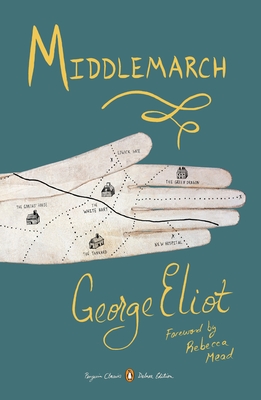








This Norton Critical Edition includes:

One of the most accomplished and prominent novels of the Victorian era, Middlemarch is an unsurpassed portrait of nineteenth-century English provincial life. Dorothea Brooke is a young woman of fervent ideals who yearns to effect social change yet faces resistance from the society she inhabits. In this epic in a small landscape, Eliot's large cast of precisely delineated characters and the rich tapestry of their stories result in a wise, compassionate, and astute vision of human nature. As Virginia Woolf declared, George Eliot was one of the first English novelists to discover that men and women think as well as feel, and the discovery was of great artistic moment.
Introduction by E. S. Shaffer (Book Jacket Status: Not Jacketed)




Introduction and Notes by Doreen Roberts, Rutherford College, University of Kent at Canterbury.
Middlemarch is a complex tale of idealism, disillusion, profligacy, loyalty and frustrated love. This penetrating analysis of the life of an English provincial town during the time of social unrest prior to the Reform Bill of 1832 is told through the lives of Dorothea Brooke and Dr Tertius Lydgate and includes a host of other paradigm characters who illuminate the condition of English life in the mid-nineteenth century.
Henry James described Middlemarch as a 'treasurehouse of detail' while Virginia Woolf famously endorsed George Eliot's masterpiece as 'one of the few English novels written for grown-up people.

Chiltern Publishing creates the most beautiful editions of the World's finest literature.
Your favorite classics in a way you have never seen before; the tactile layers, fine details and beautiful colors of these remarkable covers make these books feel extra special and look striking on any shelf.
Silas Marner tells the story about a weaver and how his life changes. The story begins with Silas, who has been displaced from his former home after being falsely accused of stealing money from his chapel. He settles in Raveloe and takes up the profession as a weaver. The only happiness he gets from his solitary life is with the gold he has acquired by working sixteen hours a day. His reclusive and depressive attitude has driven away most of the villagers.

George Eliot's beloved classic novel--hailed by Virginia Woolf as masterful--follows the life, loves, foibles, and politics of the residents of a fictional English town set amid the social unrest of the Industrial Revolution. This beautifully designed Harper Perennial Deluxe Edition--with special cover effects and French flaps--includes an introduction by award-winning author Francine Prose.
Dorothea Brooke married Edward Casaubon--a clergyman and scholar some years her senior--naively hoping their union would be a true meeting of the minds. Trapped in a lonely marriage to a tyrannical man, she finds companionship with Edward's cousin, but her overtures risk her spotless reputation and jeopardize her future.
Young doctor Tertius Lydgate comes to Middlemarch full of progressive ideas, eager to volunteer his skill at the local hospital. Through his connections there he meets the mayor's beautiful daughter, Rosamond Vincy, and marries her, only to face financial ruin at the hands of her materialism and overwhelming vanity.
Rosamond's brother, Fred, is destined for the Church to improve his family's class standing, but his childhood sweetheart, Mary Garth, refuses to marry him unless he pursues a more suitable career. Forced by fate into uncertain financial circumstances, Fred must question his choices and desires if he hopes to earn Mary's respect.
God-fearing and esteemed, Nicholas Bulstrode is a good man and trustworthy banker--or so it appears until an old enemy comes to town, intent on revealing Bulstrode's shady past dealings. Terrified of being exposed as a hypocrite, he takes matters into his own hands, each desperate act spiraling him further into disgrace and corruption.
A masterwork of fiction, Middlemarch traces these four lives in a plot that illuminates the social fabric of mid-nineteenth-century England. Looming above the landscape of Victorian literature, Eliot's beloved novel explores the perennial struggle between individual and society, integrity and temptation, and is as timely today as when it was first published.




